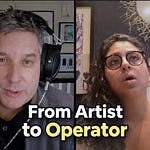Sometimes on Keep Going, I talk to people who have failed a few times and got up again. Other times, I talk to people who were hit so hard that getting up again was the entire story.
Lizzie Snider is one of those people.
On paper, Lizzie was doing everything right. She was applying to PhD programs in psychology, doing research on child development and psychopathology. Then she was in a car accident. A serious one — double impact, traumatic brain injury, cognitive symptoms that left her unable to spell her own name, let alone write a research paper.
Doctors told her she was done. No grad school. Possibly permanently disabled.
She didn’t accept that.
Instead, she went deep into functional medicine, psychedelics, acupuncture, and eventually founded Global Wellness — a community-focused practice for trauma recovery that works with somatics, breath work, and integration therapy. Her work helps people manage PTSD, anxiety, concussion recovery, and emotional trauma using treatments that are often outside the standard psychiatric playbook — but increasingly supported by evidence.
We talked about what healing looks like when you’ve been told healing isn’t possible.
We also talked about how hard it is to navigate recovery when your mind is the thing that’s been injured. That’s one of the most important things that stuck with me: it wasn’t just the trauma that was the problem. It was the disorientation — the loss of memory, the fractured sense of self, the daily struggle to remember basic things. That’s what she calls “the real trauma.” Not the event, but the residue it leaves behind in your nervous system.
Lizzie was clear: she tried the traditional route. Top clinics. Pain programs. Long rounds of meds. It didn’t work. So she started exploring alternatives, carefully. Ketamine, SGB (stellate ganglion block), hyperbaric oxygen, neurofeedback. Eventually, she found a blend that helped her stabilize. It wasn’t a miracle. It was experimentation, patience, and persistence.
Now, she runs Global Wellness to help others find that path before they fall through the cracks. We talked about how to know when something is off — not just physically, but emotionally and mentally. If you’re judging others constantly, feeling shame, feeling blame, Lizzie says, that’s your sign. That’s your signal that something’s out of alignment. That’s the time to pause.
One of the simplest techniques she recommends? Coughing. Literally just coughing.
It sounds ridiculous, but it’s part of vagus nerve stimulation. You can also do breath work, cold plunges, or light gag reflex activation. All these methods help reset the nervous system, which can be on high alert for years after trauma.
If you're building a startup, hitting a wall, or just burning out quietly — listen to this one. Not every setback is dramatic. Some are invisible, creeping, slow. But they still knock you off your path.
Lizzie’s story is a reminder that healing isn’t always linear, but it’s always possible — especially when you stay curious and stay connected.










